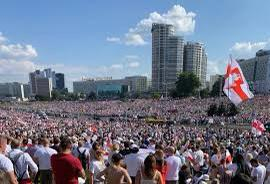
On the first of November each year, Belarusians celebrate Dziady, or 'Forefathers Eve', a day spent honouring the dead. Families across the country serve up honey, barley porridge, and eggs and wait to be joined around the dinner table, their guests being the spirits of the dead.
An event that is often undertaken with a strong dose of gallows humour, this year's Dziady certainly reflected the economic gloom that has enveloped Belarus. Western sanctions, imposed this summer by the US, UK, and EU on President Lukashenko's despotic regime, have put a dent in the country's finances and Belarusians are feeling the squeeze.
As Belarussians suffer, an international consensus is building that while sanctions have eroded the foundations of the Belarusian economy, the arrival of support from the Kremlin, and even a potential union with Russia, mean that this suffering serves no purpose, the sanctions will not have their intended effect.
A zombie economy
With gross domestic product (GDP) forecasted to contract by 2.2% this year, the raft of trade and financial restrictions imposed on Belarus are clearly taking their toll.
Worst amongst them is the EU's import ban on premium potash products, Belarus' largest export, which is predicted to slash the country's annual potash exports by 15-20% each year.
Belaruskali, the national champion potash producer, is having to simultaneously rethink its customer base and rejig its supply chains as a result, putting its status as one of the world's largest potash producers in serious jeopardy.
Its sanction-induced decline, and the decline of Belarus' other state-owned enterprises (SOE), is seen as a dire threat to the country's Soviet-style economic model.
As described by the Atlantic Council, a think tank, Belarusian SOE, such as Belaruskali in potash, Naftan in oil, and Hrodno Azot in nitrate fertiliser, are directed from on high by the Lukashenko regime.
Any losses they sustain are subsumed by the national banks, which account for 75% of all domestic bank loans, meaning that inefficiency and poor management have become the norm.
A Russo-Belarussian union
Belarus does still manufacture consumer products, but these tend to be of low quality and are mainly produced for the Russian market. Its antiquated economic model, combined with the more recent burden of foreign sanctions, is therefore very much akin to that of Russia.
Thrown off course by the global financial crisis, then irreparably damaged by Western sanctions in response to the annexation of Crimea in 2014, Russia's weak currency and persistent inflationary pressures mean that its economy is yet to recover to pre-2008 levels.
Like in Belarus, decision-making is centralised, and senior positions are doled out to the allies of the President, Vladimir Putin.
As a consequence of his economic mismanagement, 12% of Russians still live below the poverty line and with the IMF estimating that Belarus' GDP per capita will fall to $7,000 this year, down from $8,000 in 2013, the outlook for the two autocratic, isolated neighbours looks bleak.
A Russo-Belarussian Union
Yet it's not just their economic outlook that is intertwined, with rumours now circulating that a Russo-Belarusian union is on the verge of completion.
Stuck under the cosh of Western sanctions, the Lukashenko regime has become increasingly dependent on Russian aid, in the form of more than $600m in loans, to tide itself over until the end of next year.
Handouts from Putin's Kremlin are now the basis of the Belarusian economy and having been marginalised by the West, the country cannot do without them. Yet Lukashenko's'any port in a storm' approach to economics is hardly a sustainable long-term strategy.
There's little doubt that a Russian takeover would mean the shuttering of its biggest companies, like Belaruskali, in order to entrench the competitive advantage of their Russian counterparts.
Such a union would therefore herald the destruction of Belarus' economic sovereignty and if Russia's anaemic economic performance is anything to go by, this will have a grave impact on the living standards of ordinary Belarusians.
Asleep at the wheel
Somewhat unfathomably, the West has failed to sense this danger and is yet to wake up to the fact that Belarus is on the verge of a de facto extinction.
Likewise, its leaders have not realised that their sanctions have only served to push Lukashenko into Putin's clutches, rather than bringing him to heel.
In sum, unlike those celebrated on Dziady, Belarus' economy remains alive for now, but the misery imposed by Western sanctions, and the resulting submission to Russia, is the grim reality faced by its citizens.
Disclaimer: IBT Does not Endorse the above content









